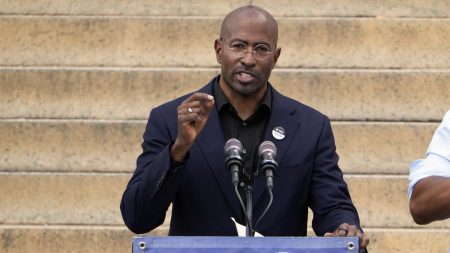Representative Lauren Boebert (R-Colo.) has secured the top spot on the ballot for the Colorado GOP primary after gaining the highest percentage of delegate support at the district assembly on Friday.
Boebert, who is competing for the complete two-year term in the former district of Republican Representative Ken Buck in eastern Colorado, received 41 percent support from the 527 delegates present at the assembly, according to the Colorado Sun. This allows her name to appear first on the GOP ballot in June.
The procedure to qualify for the primary ballot is complex and provides candidates with different options to achieve it: They can either collect at least 1,500 signatures from their district, go through the assembly process to earn at least 30 percent of the delegate vote, or choose a combination of both — meeting the 1,500 signature requirement and obtaining at least 10 percent of the delegate vote, as mentioned by the Colorado news outlet.
Boebert is utilizing a combination of the signature and assembly process. Last month, the Colorado Secretary of State’s office confirmed that she had collected enough signatures to qualify for the ballot. On Friday, Boebert only needed 10 percent to qualify through the hybrid system.
Meanwhile, former state Senator Ted Harvey (R) gained 26 percent support among delegates, while former state Senator Jerry Sonnenberg (R) received 18 percent and state Representative Richard Holtorf (R) obtained 15 percent, as reported by the Colorado Sun.
Because Harvey had decided to qualify solely via the assembly process, he failed to make it onto the ballot by not meeting the minimum 30 percent requirement. Sonnenberg and Holtorf aim to qualify through a hybrid system, needing at least 10 percent of the delegate vote. Other candidates have solely pursued the signature route.
This is the latest development in the ever-changing story to secure Buck’s seat.
Boebert currently represents the 3rd Congressional District in western Colorado but has opted to run in Buck’s district — the 4th Congressional District in eastern Colorado — to avoid a repetition of the costly House race from the last cycle. Boebert has also mentioned that she is seeking a fresh start after finalizing the divorce with her ex-husband.
Buck announced in November that he would not be seeking another term in the House, opening up his seat. However, he surprised by announcing his early retirement last month, leading to a special election to fill the remainder of his term.
This initially complicated Boebert’s path to winning Buck’s seat, as it creates two elections: a special election to fill his term and a GOP primary for the complete two-year term beginning in January, both taking place on the same day, June 25.
Boebert couldn't vacate her seat to run for the GOP nomination in the special election, which would have triggered a special election for her seat and endangered the Republicans’ narrow majority in the House.
However, the Colorado Republican secured a victory when former Parker Mayor Greg Lopez (R) was chosen to be the GOP nominee for the special election. Lopez expressed his intention to run only for the remainder of Buck’s term, giving Boebert the opportunity to compete in the June GOP primary. Because Colorado’s 4th Congressional District tends to support Republican candidates, the winner of the GOP primary in June for Buck’s seat will be very likely to win in November for the full-year term.
In a statement on X, Boebert expressed that she felt privileged after the vote.
“I feel privileged to have gained the support and confidence of CD4 Delegates as the ONLY Republican to qualify through the Assembly process today! I kept my promise and I will make you proud!” she
Rep. Lauren Boebert (R-Colo.) secured the top spot on the ballot for her Colorado GOP primary after obtaining the highest percentage of delegate support on Friday at the district assembly. Boebert, who is running for the full two-year term in former Republican Rep. Ken Buck’s eastern Colorado district, received 41 percent support from the… said.









